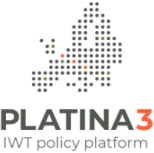
The EU-funded PLATINA3 project intends to provide targeted coordination and support activities to promote inland waterway transport (IWT) in Europe. Starting from January 2021, the project will run for 30 months.
The platform will be a catalyst for awareness, stakeholder engagement and uptake of outcomes from related national and European projects and initiatives. PLATINA3 will consolidate their findings, assess their impacts and gaps.
Inside the project, a specific task is dedicated to improving the funding and financing conditions for investing in green technologies. Shippers and brokers may play a significant role for the evolution of vessels towards zero-emission.
What is there to gain for your company in answering this questionnaire? An opportunity to have your views included in a widely disseminated report and contribute to improving knowledge about the role of shippers/brokers in the greening challenge.

More information
There are many ways to make transport greener without even making it more expensive. Making better use of the assets for example by increasing the loads is such way.
However, making assets (vessels in this case) greener by using new technologies is a different story. The total cost of ownership (TCO) for equipping vessels with green technologies is higher than current conventional diesel powertrains, either for new vessels or for retrofitting. A large amount of financing should be sought by vessel owners in order to be able to implement these technologies. Given the Green Deal and Europe’s Fit for 55 will make such investments mandatory.
Longer contracts (ie around 10 years) between cargo owners and vessel owners would provide more certainty for vessels owner, and therefore a guarantee for a bank to lend money.
Another option could be to favour greener vessels when contracting: it will lead to a competitive advantage compared to traditional vessels and encourage vessel owners to take risks and invest.
We thank you a lot for your answers and your time.
